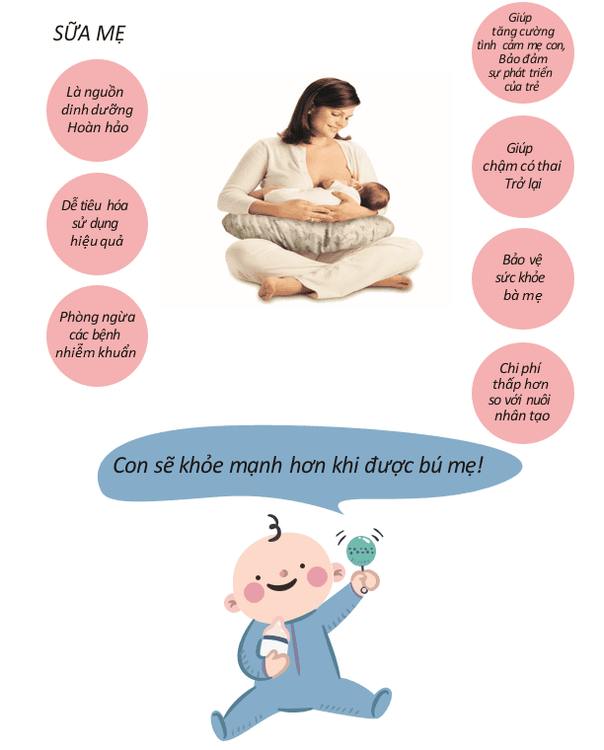This is an automatically translated article.
One of the most important factors for the baby to grow well and gain weight evenly is the infant's nutrition. To help mothers understand the composition of breast milk and the process of milk formation, how to breastfeed in the correct position and effectively, here are the instructions of Professor Dr. Pham Nhat An - Director of the Center for Pediatrics. at Vinmec Times City Hospital.1. Why is breastfeeding good for both mother and baby?
In the infancy stage, children need to adapt to the living environment. Nutrition for children is a measure to help children adapt to oral digestion, reducing the risk of disease.Breast milk is the most important food because it promotes the development of the infant's immune system and meets the child's developmental needs. Breast milk helps babies reduce the risk of infections, better digestion and makes them smarter.
Early breastfeeding is good for both mother and baby. After giving birth, the mother's breasts will gradually swell up and colostrum begins to secrete, which is the time when the mother should breastfeed the baby. Breastfeeding early will create good conditions to stimulate the mother's milk glands to produce more milk and help the mother's uterus to contract well.

2. Stage of breast milk formation
Colostrum: The best milk because it is rich in nutrients, provides a large amount of calories and antibodies that help the baby build the immune system. Colostrum is produced during 16-20 weeks of pregnancy and secreted in the first 2-3 days postpartum. Milk is pale yellow and thick. Colostrum has a high concentration of proteins, lipids, antibodies and vitamin A. Transitional milk: The amount of protein, vitamin A gradually decreases, the composition of milk gradually stabilizes. Permanent milk: The main ingredients are protein (Protein), fat (Lipid), sugar (Lactose), in addition to other vitamins and trace elements and antibacterial substances in breast milk to help children have resistance. and immunity to some special diseases in the first 6 months.3. Diet for children
In the first month, babies eat 7-8 times/24 hours, some children eat less, so feed every 2 hours.Do not give bottles to babies because babies who are used to pacifiers will not breastfeed. However, if the mother's nipple is inverted, or too small, and the "feeder" is not effective, it is acceptable to give the baby a bottle.
4. To assess the baby is getting enough milk, it is necessary to rely on the following signs:
After feeding, the mother's breasts soften. Children urinate >5 times/day. Children defecate many times "lilac, mustard flowers". Physiological weight loss in children is low (< 10%). Weight returned at birth: ≤ 1-2 weeks. Children gain weight 20-30g/day in the first 3 months. If you want your baby to suckle well, you need to breastfeed properly. Mothers should sit breastfeeding to easily monitor the baby while nursing, only lying down to breastfeed when the mother is still tired or has pain in the incision (the first stage after giving birth).
In order for the mother and the child to work well together, the godmother and the child's body are in a straight line. The baby's face is facing the breast, the lips are opposite the nipple, the baby's mouth is wide open, the lower lip is brought out, the baby is sucking the areola, the baby's cheeks are puffy. If suckling correctly, your baby will suck slowly, deeply, stopping occasionally and you can hear a "swallow" sound. It is advisable to let the baby suckle all of one breast and then switch sides so that the baby can take both the foremilk and the last milk. After feeding, you need to burp your baby to avoid vomiting or bloating.
If there is not enough breast milk, additional formula can be given to the baby on demand. When feeding babies with milk from bottles, spoons, etc., it is necessary to make sure to clean and disinfect boiled or steamed utensils. When mixing formula, it must be in the ratio recommended by the manufacturer. Children who need to eat special milk must strictly follow the instructions of the neonatologist, absolutely do not use rice water, porridge, sweetened condensed milk to nourish the child.

Please dial HOTLINE for more information or register for an appointment HERE. Download MyVinmec app to make appointments faster and to manage your bookings easily.














